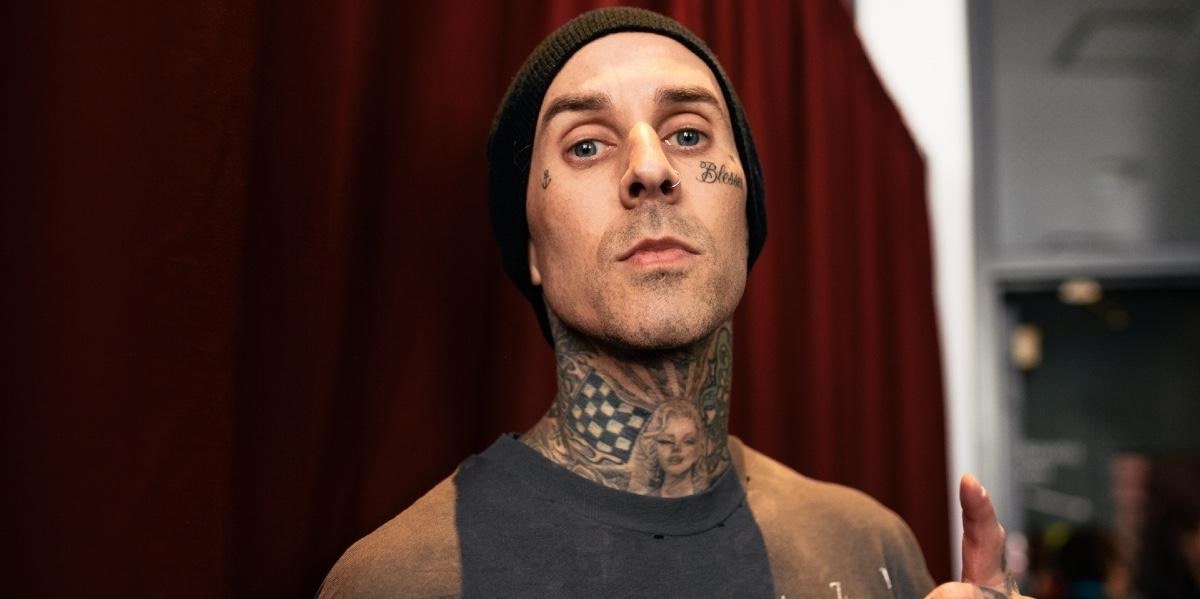How Travis Barker Survived The 2008 Plane Crash That Killed His Friends & Left Him With PTSD
He's so much stronger than any of us knew.
 Getty Images
Getty Images Travis Barker was in a 2008 plane crash that claimed the lives of four people, and he is still recovering from the trauma of that event.
In a recent interview, the Blink-182 drummer discussed his long-term recovery from the fatal crash and how it forced him to reevaluate his life and addiction struggles.
Barker’s career has received renewed attention in recent years through collaborations with Machine Gun Kelly, Halsey, and his high-profile relationship with Kourtney Kardashian. But many may have forgotten that the drummer was forced to pause his professional life, as he learned to walk and play the drums again following the crash.
Now Barker is reflecting on the physical and emotional strength that it's taken to overcome physical injuries and post-traumatic stress disorder in order to survive.
How Travis Barker almost lost his life in the 2008 plane crash.
Barker is the only remaining survivor of the plane crash. Barker had boarded the plane with friend and collaborator Adam “DJ AM” Goldstein, after playing a South Carolina show.
The pair were also joined by two close friends, assistant Chris Baker and security guard Charles “Che” Still.
During takeoff, the tires of the plane blew, causing the aircraft to skid across the runway and out to a nearby highway, engulfed in flames.
Two pilots, as well as Still and Baker were killed while Barker and Goldstein escaped. Barker was soaked in jet fuel and Goldstein used his own shirt to put out the flames, leaving the drummer covered in 3rd-degree burns on 65% of his body.
Goldstein passed away a year later from a drug overdose after prescription pain and anxiety medication became a gateway back into addiction.
Barker has been battling PTSD for over a decade.
Barker required 27 surgeries and several skin grafts during a three-month hospitalization for his physical injuries, but said the PTSD and survivor’s guilt has been a much longer recovery.
For the first year, he and Goldstein were each other’s “therapists” as they struggled to find support.
"So it was just him and me," he said. "When he left, I was like, 'Oh, f---. I'm the only one in my club. It's just me."
Barker eventually attended months of therapy and dove into breathwork as a means of releasing trauma, and now has his own CBD-infused wellness line which he personally uses.
He says time has also been the ultimate healer: “It’s gotten better the further I get away from it.”
“The closer I was to it, it felt like I was closer to the bad stuff than I am to the good stuff. I felt closer to the experience of trying to escape, [to] being in an accident and being burned, trying to grab my friends from a burning plane. That haunted me for a long time.”
Barker hasn’t stepped foot on an airplane since the crash. He travels the U.S. by bus and goes overseas by boat. But he says he has plans to fly again someday.
The plane crash helped Barker overcome drug addiction.
The crash also proved to be a necessary wake-up call to kick his drug addiction. He had been abusing prescription pain medication to combat his prior fear of flying during Blink-182’s tours.
Barker says he developed such a high tolerance to opioids that he would occasionally wake up during surgeries after the crash. After coming home from the hospital he flushed his medication and never abused substances again, apart from the occasional drink.
“People are always like, ‘Did you go to rehab?’ And I [say], ‘No, I was in a plane crash.’ That was my rehab,” Barker says. “If I wasn’t in a crash, I would have probably never quit.”
PTSD recovery is an ongoing journey.
Barker’s tattoos have become a way to carry those who he has lost with him. After losing many of his tattoos in the aftermath of the crash, he had a blank canvas to memorialize his friends.
Barker says he has tattoos dedicated to his friends who he lost in the crash, others who died over the years, and his mother who passed away from cancer when he was 13.
He says letting go of trauma is an ongoing process that gets easier day by day, even if some aspects are hard to carry.
“It will never make sense why my friends are gone, or the pilots, but all I can do is carry on. I can’t regret anything. I’m 100 percent supposed to be here.”
Alice Kelly is a writer living in Brooklyn, New York. Catch her covering all things social justice, news, and entertainment. Keep up with her Twitter for more.

